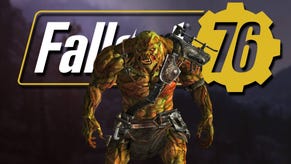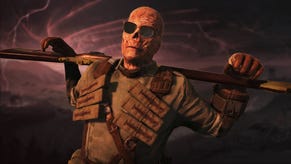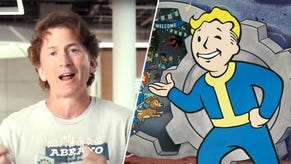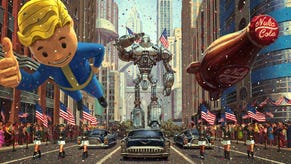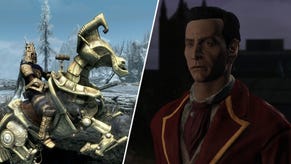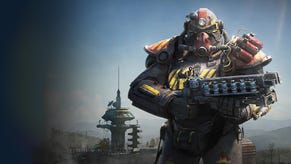Fallout 76 Review
The trials and tribulations of one Vault Dweller in West Virginia.
This article first appeared on USgamer, a partner publication of VG247. Some content, such as this article, has been migrated to VG247 for posterity after USgamer's closure - but it has not been edited or further vetted by the VG247 team.
Back in 1961, a company in West Germany produced the Amphicar Model 770. As the name suggests, the Amphicar is an amphibious car, a vehicle that's meant to operate on land and on water. The problem is in trying to do both, the Amphicar isn't particularly good at either mode of transportation. Handling and weight distribution mean that it controls poorly at high-speeds on the road, and in the water it's rather slow. "It's not a good car and it's not a good boat, but it does just fine," one owner told the Seattle Post Intelligencer. "We like to think of it as the fastest car on the water and fastest boat on the road," added another.
This is the problem with Fallout 76. It's not a particularly great Fallout game, but it's also not a great online survival experience. In trying to do both, Fallout 76 never touches either experience.
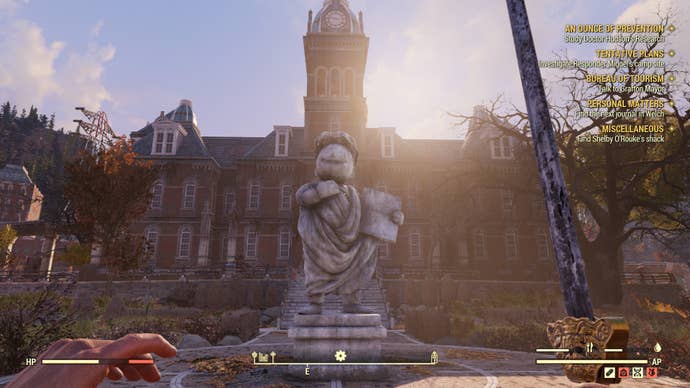
Fallout 76 springs from ideas tested in Fallout 4: the Survival Mode, base-building, and detailed resource collection can all be seen as a precursor to this game. Fallout 76 drops you into the wilds of West Virginia before the events of any previous Fallout game. You're a survivor of Vault 76, tasked with rebuilding society after the Great War and the Scorched Plague. Fallout 76 wants you wandering Appalachia, shooting nearly everything that moves, collecting stuff, finding out what went wrong, and most importantly, interacting with other players.
At times, you can completely forget that you're playing an online-enabled Fallout. Exploring the decaying, forgotten remnants of civilization in West Virginia feels as it did in Fallout 3, Fallout: New Vegas, and Fallout 4. Bethesda has taken a look at the game's base-building mechanics, offering an improvement in the more mobile C.A.M.P system, rather than a set location for construction. Fallout 76 still carries forward some of the issues with weight and inventory management that I had with Fallout 4. But when you're in a sub-basement shooting at ghouls, reading computer terminals, and taking everything that's not nailed down, those neurons forged in modern Fallout start firing.
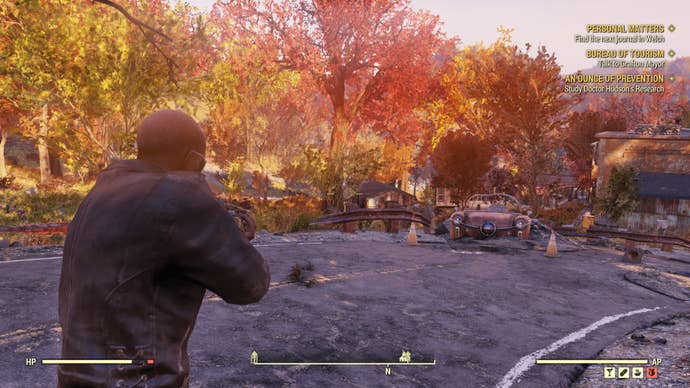
A Beautiful, Lifeless World
Visually, I'd say Fallout 76 looks pretty damned good. Stepping out of the Vault and looking down onto the valley below, with the bright reds and oranges of fall, is a stunning beginning. If you've played Fallout 4, you'll have a basic idea of what to expect here. Performance is still all over the place. I'm running an Intel i7-4790 and Nvidia GTA 970; my rig runs Fallout 76 at respectable levels for the most part (45-60fps on average). I've tweaked the settings to offer more consistent frame rates, but the game will still dip hard when you're coming into town or fighting against some enemies.
You can tell Bethesda's environmental artists had a field day. You'll crest a hill and look down on some new region of West Virginia, like an abandoned theme park, the forgotten swamps of the Mire, the palatial Greenbrier resort, or the beaten-down West Virginia Capitol Building. And it looks amazing. Well, outdoors. Indoors, the maps have the same look that you've seen from previous Fallout titles; it's odd that cities have their own fingerprints, but the insides of homes and offices feel the same. You'll take a screenshot and head down to explore the location only to find... nothing of note in each building.
Bethesda decided to experiment with Fallout 76. There are no human non-player characters (NPCs) in the game, no one to talk with and explore even basic dialogue options. I didn't like Fallout 4 all that much, but I could at least praise the characters, with interesting standouts like Nick Valentine or Piper Wright. Fallout 76 has none of that, because as a design choice, Bethesda decided that the only humans you'll meet in the game are other players. There could've been some interesting conversations with the automatons left behind, but even those lack meaningful interactions.
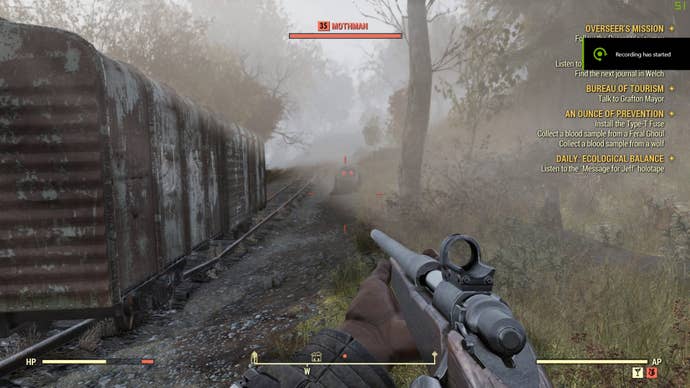
This means that all of the quests and adventures are delivered through audio logs and computer terminals. Bethesda tries to infuse them with some life, but it doesn't really work, and every mission breaks down to the same thing: go to a place to find out the final fate of a person. Maybe they died recently, maybe they died years ago. Perhaps they went peacefully, perhaps they died fighting. The outcome is same. The entirety of Fallout 76's campaign is a breadcrumb trail of death from one part of the map to the next.
The only shine are the occasional encounters with the weirder creatures of Fallout's West Virginia. The Mothman has been mentioned frequently, but the alien Flatwoods Monster, the comical Mega Sloth, or the creepy Wendigo provide a little color to the world. I'd hazard that Fallout 76 might have the largest enemy collection of any Fallout game. Unfortunately, most of your time will see you fighting against the zombie-like Scorched and Super Mutants, so that variety ends up being moot.
The endgame is also kind of sparse at the moment. Currently, finding the most challenging encounters requires accessing a nuke and then using it at different locations around the world to summon high-level monsters, like the Scorchbeast Queen. Players have already challenged that raid-level monster, leaving very little ahead of them but to do it again for more legendary loot. This is a consistent problem with online service games in general, but Bethesda doesn't seem to have roadmap of content ahead, like some other titles.
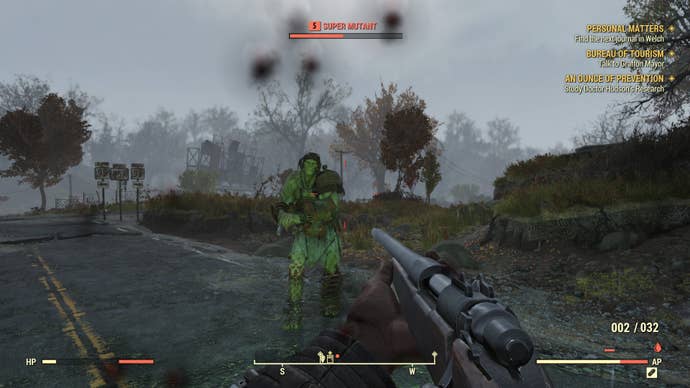
Combat: Fighting The Game
Fallout 76 brings the combat of Fallout 4 forward with few changes, and it's not for the better. The traditional shooting of Fallout 3, Fallout: New Vegas, and Fallout 4 has never been great. It does the job within the confines of an RPG, but it's not a proper shooter. The Vault-Tec Assisted Targeting System (VATS), has always papered over those problems, still providing hooks to bring back something resembling the turn-based combat in the original Fallout games.
The problem here is Bethesda brought VATS forward without changes. Since Fallout 76 is an online-only game, VATS can't pause the action to allow the player to carefully choose whether they're going to shoot at the head, body, or various limbs. This means VATS operates in real-time, calculating your chance to hit body parts on the fly. Since the enemy is moving, these chances can vary wildly from second to second, which means VATS itself doesn't really work.
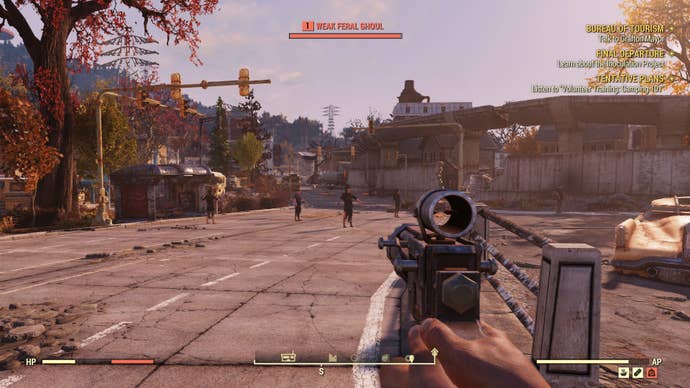
I still used VATS, but mostly to aim at enemies in a cluttered environment. The combat readability of Fallout 76 is horrible: enemies don't really stand out from the environment, so it can't be hard to tell where damage is even coming from. VATS allows you to snap to an enemy at least, letting me drop back out and take my shot manually. That's still a kludge for a combat system that lacks clarity. Sometimes I had to use VATS to hit enemies right next to me, including attacking Scorched or Radroaches. Shots which looked like they were spot-on would miss otherwise. I don't know whether that's server issues, or some odd quirk of the game.
The opposite side of combat is against enemies that will frequently bug out or get caught on something in the environment. I'll frequently find enemies who are just stuck in a single position, allowing me to easily dispatch them. The first time I fought the Grafton monster, it got caught on a rock, allowing me to continuously headshot it from range. Scorched and Super Mutants form most of your encounters and all they do is charge at you or half-hide behind cover. (Dispatched enemies will also respawn minutes after you've cleared an area at times.) Combat just isn't all that satisfying in Fallout 76. It's fine. I can shoot things and they'll die. But rarely does anything interesting happen.
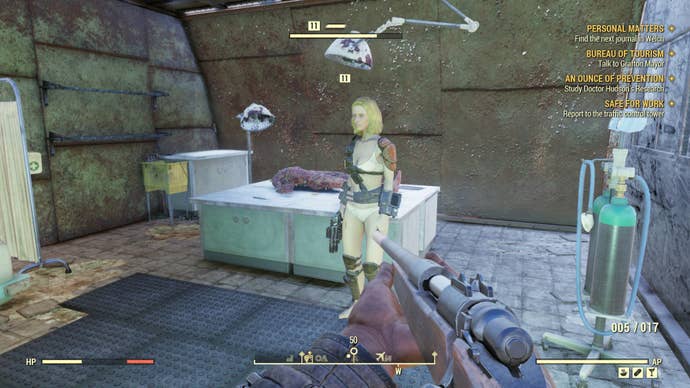
Online Play: Hell is Other People
At its best, online play in Fallout 76 is multiple players working together to tackle a random event, or a team of friends diving into a derelict building together. It's not always at its best though.
When I've run into other Vault 76ers, there's a wide variety of outcomes. Some don't talk at all, and don't interact; they're busy on their own missions. Others use the built-in emotes before going on their way. One guy followed me around for 10 minutes talking about the game before realizing that I wasn't going to provide anything to the conversation; I almost felt bad about that one. Some have been jabbering about nothing in particular while in earshot. And during the beta, I even had two folks shoot and kill me. Fallout 76 just drops you in a world at random, unless you join up with a friend. And with a huge map and only 24 players per server, you'll likely be spending all your time alone.
And in terms of online options, Fallout 76 is lacking. There's no easy way to jump to another server, like you would in other online survival games ARK: Survival Evolved and Rust. There are no guilds or organized groups; no player hub or even chat channel to create groups. The friend system requires you to be in game, and mutually send friend requests, instead of allowing one person to send a friend request and the other to accept or decline. Chat is purely over microphone, but there's no push-to-talk option available in Fallout 76, though Bethesda said it's coming soon. Fallout 76 is just missing a lot of basic online connectivity. A number of 76 fans contend the game is much better with friends, but Bethesda doesn't make it easy to buddy up. (Also, I feel like the same was said of Destiny 2 near launch, but the longevity of the experience itself didn't bear that out.)
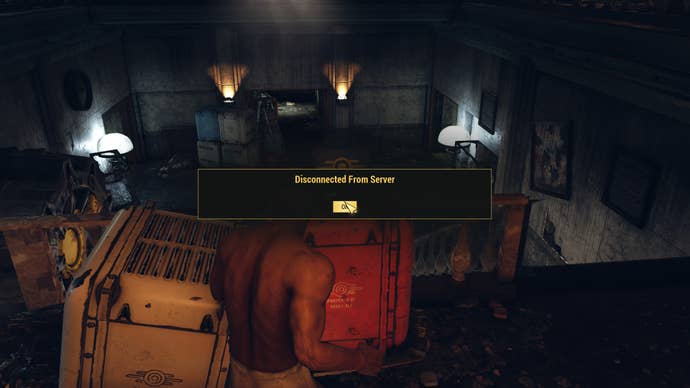
The other issue with Fallout 76's online is the general stability of it. I'm not too down on the occasional disconnect in an online game; it happens, especially around launch. What I resent is losing time or resources to those disconnects. I was completing a random event in one town with two other players when I disconnected the first time. Upon reloading, I was no longer in the event, or even in the same area, meaning all the effort (and bullets) that I used to get to that point were lost.
The same thing happened again later while I was exploring solo. I was near my objective, only for the game to disconnect and reload at a completely different place. Again, anything I had used to get to that point was gone. I'm not entirely sure why Fallout 76 doesn't reload you where you logged out. I play massively multiplayer games on a regular basis, and generally that's the way it works. And my hard crash to desktop was treated the same, with a reload in a different location. Fallout 76's handling of this is perplexing.
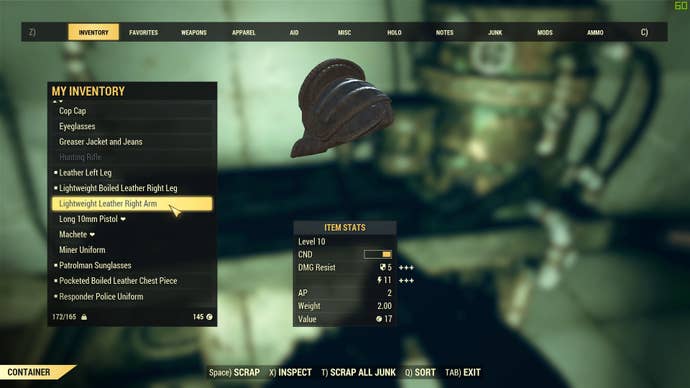
Survival: Managing Your Inventory
If Fallout 76 fails to deliver the narrative magic of past Fallout games, what about the survival aspects? They're also just fine at best. I love survival games. I've played Minecraft, No Man's Sky, Starbound, Terraria, Ark: Survival Evolved, Astroneer, Rust, Dragon Quest Builders, and more. In contrast, Fallout 76 provides a solid experience, diving into locations to strip them dry, then returning to a bench to scrap your resources and build something new. This is the part I can occasionally find myself lost inside. The survival loop is where I find my zen.
The problem is there's no highlight to Fallout 76's survival experience. Minecraft allows players to build absolutely huge structures or dig down deep. Rust is a hardcore PVP experience. Ark: Survival Evolved has a huge crafting tree and the ability to tame and ride a host of dinosaurs and other creatures. No Man's Sky now offers a host of environments across its planets to explore, from the highest mountains to the ocean depths. The best Fallout 76 has to offer is providing context to your survival actions, but I think Dragon Quest Builders does that better.
Yes, few of these games started at their current builds, but Fallout 76 is competing directly against them now and Bethesda has far more resources at its disposal than many of those developers. I expected something like the move from PlayerUnknown's Battlegrounds to Call of Duty: Black Ops 4's Blackout: a general level of polish given everything Bethesda has to draw upon. But that's not the case. Instead, Fallout 76 feels like it's starting at square one in terms of mechanics and online features. There might be potential there, but it's not apparent right now.
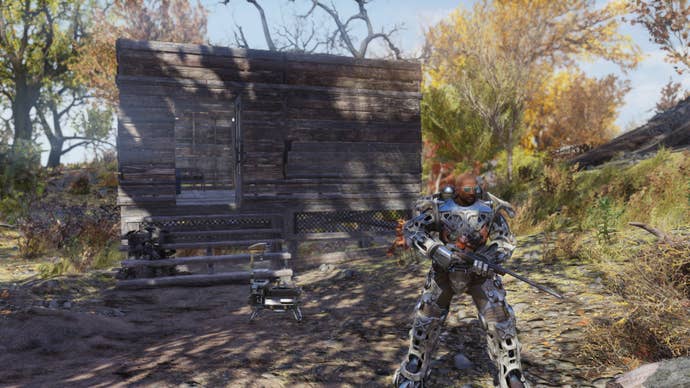
Worse, Bethesda has handicapped Fallout 76 as a survival experience. You're supposed to head out into a hostile environment with only a few tools, use those tools to explore, find useful resources, and improve your equipment, but I've never felt as constrained as I have in Fallout 76.
For one, the amount of stuff you can carry on your person feels entirely too small. You're always having to scrap weapons or armor you've just recovered from a corpse. You constantly have to leave behind random items which could be scrapped into valuable resources. Being over the weight limit gives you the overencumbered status, which lowers your stamina (AP) and forces you to walk slowly. This means that while the game is about exploration and loot in theory, your exploration is entirely blunted by the distance from the nearest crafting table. It's something Bethesda seems to have realized, because crafting tables are a feature of nearly every location you explore.
But what if you don't want to scrap your loot? Well, there are more issues to contend with. In that case, you have to carry the items around in your inventory, taking up valuable weight until you reach a stash box. Every stash box in the world is connected to your personal stash. The problem is your stash has a maximum limit of 400 lbs, and you'll find that some of the better weapons (hello, power armor!) and your crafting materials will eat up that space quite quickly. There's no way to increase your stash size either. I added another stash box at my C.A.M.P., only to realize both boxes pointed to the same finite space. I understand the idea behind item weight and forcing players to choose between what they carry, but Fallout 76 is entirely too tight in this respect compared to other survival games.
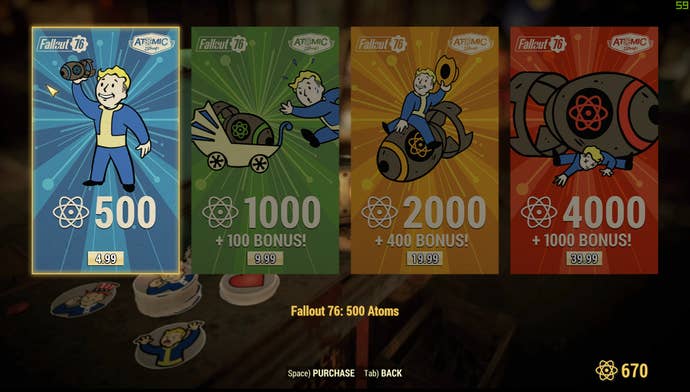
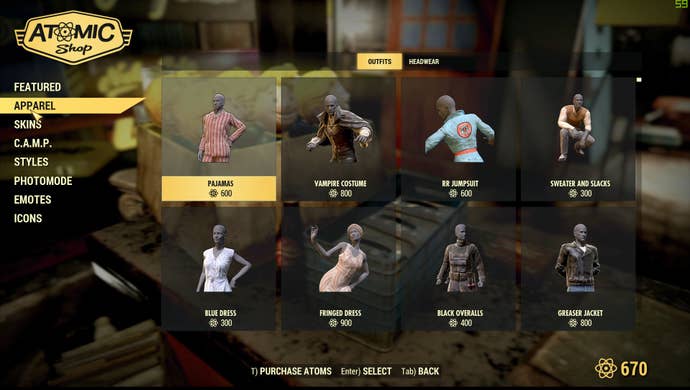
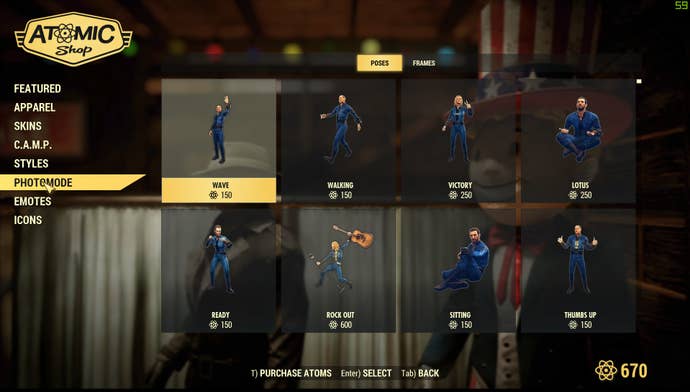
I'm not going to say things like "Fallout 76 shouldn't exist," or "there's no saving Fallout 76." Zenimax Online was able to turn around The Elder Scrolls Online from its launch state into an excellent massively-multiplayer game that I think lives up to the name. Bethesda can potentially do the same here. But Fallout 76 isn't even a "jack of all trades, master of none" scenario right now, because it's missing the average mark in some areas, especially in terms of online connectivity options.
Fallout 76 isn't particularly indicative of the best of the modern Fallout games, nor is it an amazing survival game given its competition. It's not the worst game in the world or anything, but it very much just exists. It merely says, "I'm here too," instead of standing out. Fallout 76 in its current state is the game version of the Amphicar Model 770: it sometimes works, but it's still the worst of both worlds.
ConclusionFallout 76 is not a great Fallout game, but it's also not a great online survival experience. In failing to do either, Fallout 76 consigns itself to a mire of mediocrity. With no strong narrative and characterization, you're left with combat, which hasn't been improved much. As a survival game, it has few highlights and the tiny inventory means looting and crafting are constricted. And it lacks several basic online options or features if it's intended to be a more social experience. Fallout 76 may be great one day, but the launch experience doesn't reflect that potential.


